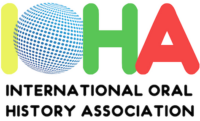First of all, we would like to inform you that the promised post-conference materials will be available on the website of the Polish Oral History Association a little later than expected. Please look out for them at the beginning of November here: https://pthm.pl/home/. The delay is due to ongoing work on the Spanish subtitles for the recorded sessions. We sincerely apologise for the inconvenience. We know many of you are looking forward to accessing the photographs, the full programme with abstracts, and the recordings (we hope the first two will be available even sooner!).
Secondly, we warmly encourage those of you who haven’t yet joined the IOHA to consider becoming members. We are planning several new initiatives, including regular newsletters, online workshops, and more. You can join by paying the membership fee, which covers a two-year period. For more details, please visit: https://ioha.org/join-ioha/.
Thirdly, as we are still inspired by the presentations, talks, and discussions we enjoyed while hosting you in Krakow! As the organisers, we have come to the conclusion that this intellectually fruitful spirit needs to be somehow prolonged and perpetuated. Therefore, we came up with another idea, which we would very much like to encourage you to participate in.
The conference showed the scale and variety of global oral history. We aim to showcase this diversity and, at the same time, learn from you about the current problems and challenges you perceive. Therefore, we are reaching out to you with a brief survey, the results of which will be published in the Wrocławski Rocznik Historii Mówionej (Wrocław Oral History Yearbook, https://wrhm.pl), a Polish academic journal dedicated to oral history. Its purpose is to bring together diverse reflections on the state of and trends in contemporary oral history, in particular, on its key research problems.
In our survey, we focus primarily on the research problems and challenges that, in your opinion, oral history faces today or in the near future. We specifically refer to issues that cause us problems, but which can be addressed in a somewhat positive manner: finding a solution or answer that advances research or contributes to the implementation of the ethical principles of oral history. Often, naming a problem directly is the first step towards solving it.
We are keen to hear voices from different places around the world and various places within academia (from professors to doctoral students and undergraduates), as well as outside of it. We hope that in this way, we will be able to create a diverse and truly global picture of what oral history is struggling with. Such an international chorus of voices will make it easier for us to tackle these challenges, as it will allow us to learn about the previously unknown experiences of our colleagues.
Please send your responses to the editorial board of the “Wrocławski Rocznik Historii Mówionej“. The results of this survey will be published in the 2026 volume of the WRHM and will be available in open access.
If you have any questions or remarks, don’t hesitate to get in touch with the journal or Marcin Jarząbek, who, on behalf of the editorial board, is coordinating this survey.
A Survey: Research Problems and Challenges for Oral History
1. What are, in your opinion, the most important challenges for oral history today?
2. Which research problem(s) for oral history do you find crucial to be solved? Why this/these particular? Can you think of any solutions to these problems?
3. Is there still potential for innovation in or within oral history? If so, where do you see it, and how might oral history change/be changed as a result of it?
Your answers (no longer than five pages) should be submitted by 28 February 2026 via email to wrhm@zajezdnia.org. Please include your full name, email address, affiliation, and ORCID (if applicable).
The responses will be published by the end of 2026 – the editorial board may edit and select texts.
